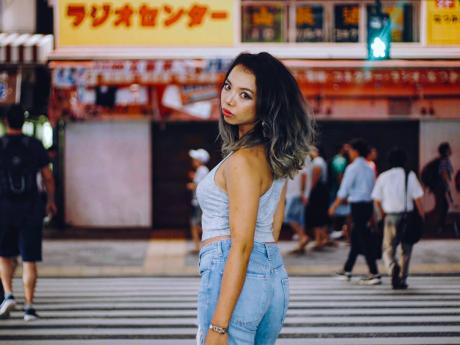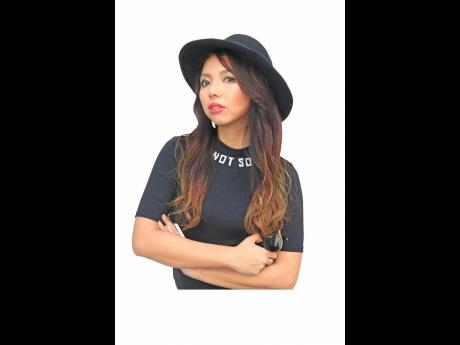Five Questions with ... Bad Gyal Marie
(With Reggae Month Celebrations in motion, F ive Questions With ... put the spotlight on female disc jockeys who are levelling the playing field, paying their dues, and contributing to the breaking-down of barriers in reggae and dancehall.)
Marie Sano was born ‘a bad gyal’ – rebellious, daring and determined – she made one of the biggest decisions to relocate from her home in Toyko, Japan, to Kingston, Jamaica, in 2009, in pursuit of a dream of becoming a disc jockey.
Speaking of breaking-down barriers, Bad Gyal Marie has done just that and more by communicating her passion for the culture without words – considering one of her major challenges to overcome was the obvious difference in languages and understanding the local lingo. She approached with a hammer-like attitude, as though the job was a nail and built her sound Notorious International from the very boxes to the brand from the ground up.
She wanted the name Bad Gyal Marie to be said with some amount of respect – here and at home.
“I never really grow up with reggae and dancehall but, when I was a teenager I was introduced to the music which was popular where I lived. I cannot forget the moment. I was on that path from high school thinking about going to university because my original career plan was set on being a doctor. After a trip to Jamaica, my life was changed and I decided I was going into the dancehall in full swing,” she told The Gleaner.
Her sound system continues to participate in the clash competitions, and are former champions of the Boom Sound Clash. She continues to spark the curiosity of many in the reggae-dancehall community and globally, not because she is Japanese, because other sound systems from the country were also male-dominated, but as a small-figured female, with a big attitude. In this week’s Five Questions With ... , Bad Gyal Marie reveals what her parents think of her career and how she is managing it.
1.What did your parents think of your decision to move to Jamaica?
Of course, my parents never want to me to move to Jamaica but I come here and really start to live. I fell in love with here and Jamaica being the place reggae and dancehall comes from, which is what I really wanted to play, I thought it was important to be here and do that here and get the respect of the people here. Now, I can say they are very proud of my decision.
2.What was your first set-up as a sound system owner and a disc jockey, and what’s happening with Notorious International these days?
Well, the very big, first thing I did is make a sound system, get the boxes made as a way to establish the brand and get persons familiar with my name. The first set-up was for a street party we planned. This was because I knew it would benefit in terms of experience and I knew I was not going to be given a chance to play – and that was about 15 years ago – and maybe if I was given time around the set like at a Weddy Weddy or Passa Passa, it would not be more than 15 minutes, which to me was a joke thing. For people to get to know my style, and for the experience, I needed more time. The sound is still around and recently did the sound clash against Dynamq and Code Red Sound on the Jamrock Reggae Cruise, and although it was not a physical win, I left feeling like a winner because of the opportunity.
3.There is a trend in the industry, that is moving away from the use of headphones; but are you one of those DJs that prefer to play with or without headphones, and how would you adjust if it becomes a norm?
Definitely with headphones. I always see other disc jockeys/selectors playing without headphones and wonder how they do that all the time, but I don’t feel comfortable to work without those tools. Although I know I can do it without, and have times that I do it, I can’t say I know how I will adjust but because I love music, if I need to I can.
4. You have a major gig coming up tomorrow, ‘I Love The 90s’, what does your approach look like – from selecting the material and preparing for opening and then building a set?
I don’t think I go into any party with a set playlist or idea for an opening because for me, that has been a challenge (anybody can come with an idea in mind) and I prefer to go off a feeling. I just make sure I have a wide selection of music and listen to all the DJs who play and watch the people inna di party because I want them to feel the same vibes and enjoy themselves. When I play music and people are excited, I feel like this is life and I am living life and that for me is rewarding.
5. When was the last time you travelled to Tokyo, Japan, and which three places do you recommend as must-see for any visitor?
I normally go once a year, in the summer for a Japan tour summer. The Mighty Crown Sound, the big reggae-dancehall sound, are my brothers and I’ve been grateful to always have their support and to work with them. If someone asks me where to go, Shibuya, which is a central for fashion, music, entertainment, and has a lot of nightclubs, the younger generation would love and also Odaiba, it has a seaside on Tokyo Bay and excellent views of the city. It’s really nice. I love shopping so, I will say Shinjuku has to be on the list.


